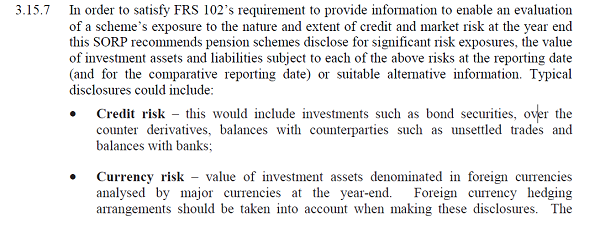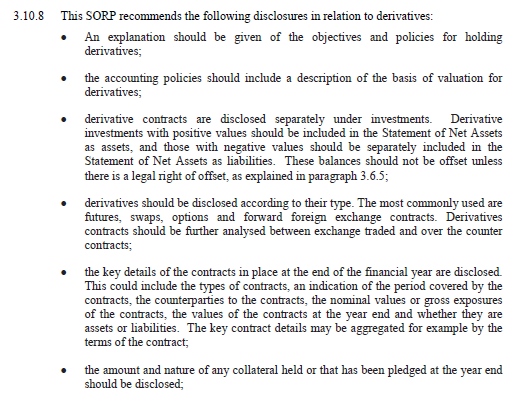The Cut: What reporting changes could mean for your scheme's financial statements
Today the Pensions Research Accountants Group released a statement of recommended practice for pension schemes' financial reports, under a three-month consultation that will close on July 16.
The draft exposure document clarifies best practice for producing trustee reports, scheme accounts, annual reports and other documents in light of the Financial Reporting Council's revised reporting standards for the UK and Ireland, FRS 102, updated last year.
Investment risk
The major obligations carried through from FRS 102 include disclosing information on the extent of credit and market risks to which the pension fund is exposed, including interest rate risk, currency risk and other price risks:
The report continues: "The notes to the financial statements should explain how the risks arise in the context of the scheme’s investment strategy.
"For example, foreign exchange risk arises where the trustees have chosen to diversify the investment portfolio into securities priced in foreign currencies."
When it comes to pooled investment vehicles, the statement recommends a "look-through" approach should be undertaken by schemes, though the working group recognises this may be difficult for fund of funds or white-labelled fund structures, in which case "reasonable estimates" should be made. It adds:
Valuing investments
The document also interprets FRS 102's hierarchy for estimating the fair value of investments: category A includes assets where a quoted price is available for an identical asset, category B includes those for which only recent prices are available, and category C contains the most illiquid assets where the price has to be estimated.
The SORP recommends the third category is split into two parts:
Both the risk exposure and valuation changes have met with early criticism from the industry. Andrew Penketh, head of pensions at accountancy Crowe Clark Whitehill, raised doubts about the usefulness of a simple statement.
He said: “It has got to a position where we really need to question what we are doing and make sure the information being provided is of some use.”
He suggested disclosing the impact that changes in interest rates, inflation and other risks would have on the scheme's funding position would be a better measure.
Derivatives
The statement also contains a list of requirements relating to schemes' derivative holdings, including dividing them between the reporting of net assets and net liabilities:
Main points for consultation
The issues for which feedback has especially been requested include the following:
- Annuities: FRS 102 requires for "annuities to be reported at the amount of the related obligation". Respondents are asked what the practical issues may be.
- Investment risk disclosures: respondents are asked whether the approach discussed is appropriate, especially the "look-through" for pooled funds.
- Fair value hierarchy: the consultation asks whether the distinctions in the approach according to different investments is appropriate.
- Auto-enrolment: the SORP recommends initial auto-enrolment contributions made are not reported until they are received by the scheme.
- Investment concentration: accounting regulations require disclosure of any investment greater than 5 per cent. Respondents are asked whether this disclosure is necessary in light of the enhanced risk disclosures.
Further analysis and reaction on the impact of the SORP will be published in Monday's edition of Pensions Expert, free to download on iPad.
Most Viewed
- ‘A fundamental point of fairness’: MPs call for action on discretionary increases
- TPR to scrutinise ‘systemically important’ professional trustee firms
- What does Labour have in store for the pensions industry?
- Defining the role of the scheme actuary
- Five themes at the forefront of a sustainable future





